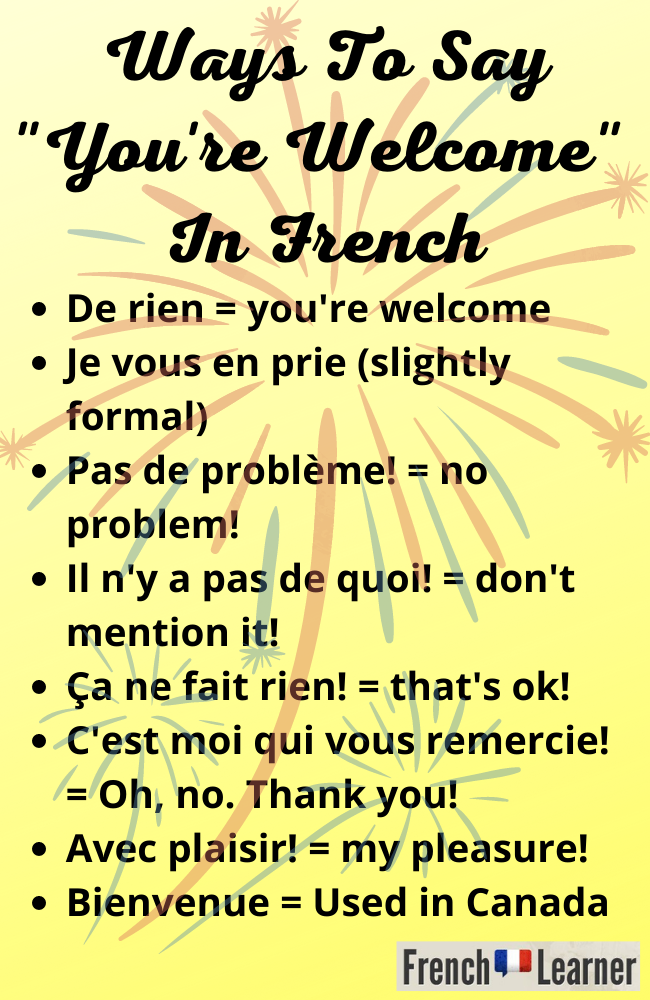You’re welcome in French is “de rien” (pronounced də ʀjɛ̃). The literal meaning of de rien is “of nothing”. Use this phrase after somebody says, “Merci”. In addition to de rien, this post will explore seven more common expressions for you’re welcome.
de rien
you’re welcome

De rien pronunciation – you’re welcome in French
The following two example sentences show how to use “de rien“ in conversation. You use “de rien“ in the exact same way that you’d use “you’re welcome” in English.
- Je vous remercie d’être venu. Thanks for coming. – De rien. You’re welcome.
- Passe-moi le sel s’il te plaît. Pass me the salt please. – Merci. Thank you. -De rien. You’re welcome.
7 more ways to say you’re welcome in French
In addition to “de rien”, there are several other way to say you’re welcome in French.
1) Je vous en prie
“Je vous en prie” is an expression that translates to “you’re welcome” or “no worries”. You can use in the place of “de rien”. You can also use the expression “je vous en prie” when opening the door for somebody of showing the way to a table, for example.
In informal situations, “Je vous en prie” becomes “Je t’en prie”.
Je vous en prie.
you’re welcome
2) Pas de problème
“Pas de problème” translates to “no problem”. This way of saying you’re welcome is informal, just as it is in English. Note that in French you cannot say “Non problème” and must say “pas de problème“.
Pas de problème
no problem
3) Il n’y a pas de quoi
“Il n’y a pas de quoi” is an other expression used for “you’re welcome” or “don’t mention it”. The expression translates literally to “there is of no what” and translates loosely to the English expression, “Don’t mention it”. A shortened verion of “Il n’y a pas de quoi” is simply: “Pas de quoi”.
Il n’y a pas de quoi
Don’t mention it.
4) Ça ne fait rien
Another expression for “you’re welcome” is “ça ne fait rien”, which translates literally to “that makes nothing” and really means “don’t mention it”, “that’s ok” and “that’s alright”. In general, “ça ne fait rien” should be used in less formal situations.
ça ne fait rien
that’s ok
5) C’est moi qui vous remercie
The expression “c’est moi qui vous remercie” is something you can use when you want also offer thanks rather than simply saying you’re welcome. The literal translation of “c’est moi qui vous remercie” is “I’m the one who thanks you”. This expression is very similar to “Oh, no. Thank you!” in English.
C’est moi qui vous remercie.
Oh, no. Thank you!
6) Avec plaisir
The expression “avec plaisir” can be used to say “you’re welcome” and equates to “my pleasure” in English. Using this expression suggests a positive attitude in response to “merci!” (thank you).
avec plaisir
with pleasure
7) Bienvenue
In French-speaking Canada, the word “bienvenue” can be used interchangeably with “de rien” for you’re welcome. The meaning of “bienvenue” is welcome.
bienvenue
welcome
In Canada, you can also say “Vous êtes le/la bienvenu(e)” to express “you’re welcome” in formal situations.
In Europe, bienvenue only used in the context of welcoming a person. For example, “Bienvenue chez nous!” (welcome to our home!).

Word of the Day lessons | Lessons by David Issokson

